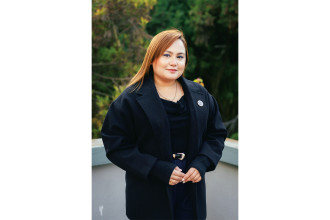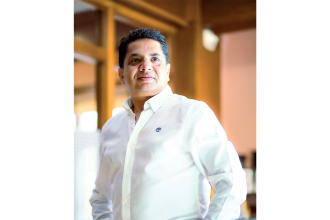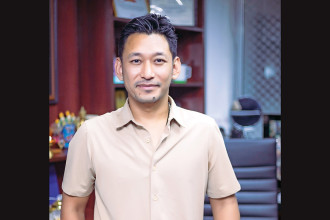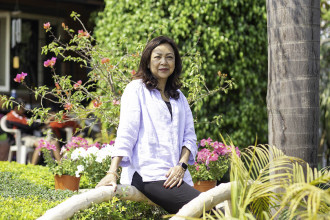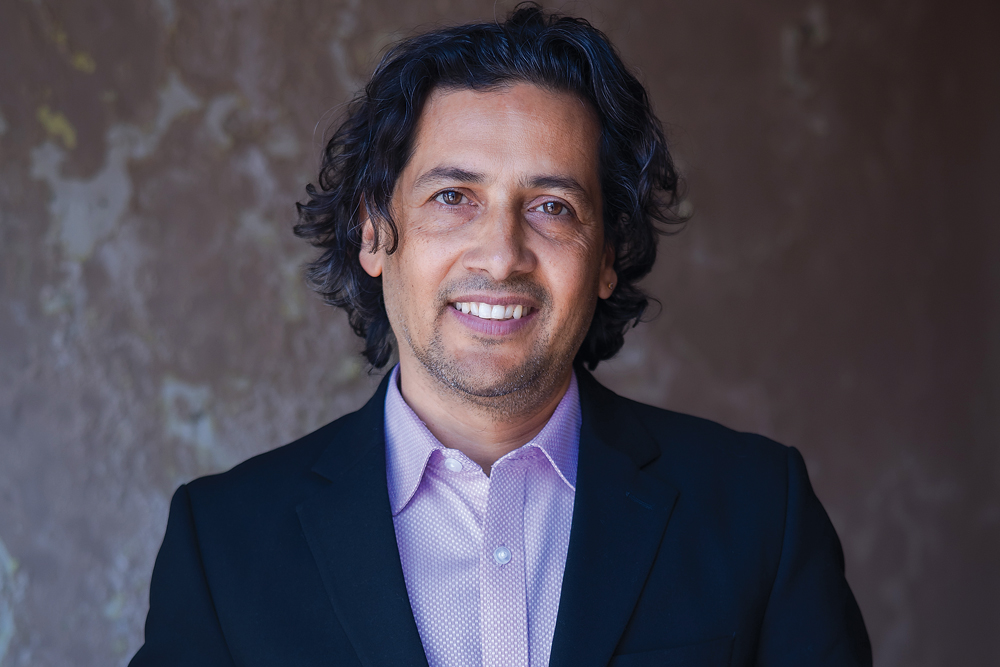
Narayan Adhikari
South Asia Lead and Co-founder
Accountability Lab
“Sometimes even having a high-paying and secure job cannot satisfy you because you feel you are not contributing enough to the community you live in, nor have you made a positive impact,” says Narayan Adhikari, South Asia Lead and Co-founder of Accountability Lab. “When I knew from deep within that I could do more for society it became a strong reason for me to quit lucrative jobs in various INGOs including World Bank and start something that will last long after I am gone,” he explains. Even as a young college-going student, Adhikari was always involved in various youth movements in the country be it the democracy or the anti-corruption movements. “I have been lobbying to institutionally include youths when the government frames policies and to also have youth-centric policies for long,” he shares. This was also the time he got to learn about the multiple issues facing society but very little progress being made despite the influx of funds from donor organisations; the gap made him recognise the need for an organisation like Accountability Lab. Adhikari says that lack of good governance, lack of accountability and traditional mindset and approach to dealing with issues are the major stumbling blocks to the country’s progress. Accountability Lab seeks to help build the transition to transparent and accountable governance and to bring positive transformation in society. In this issue of Business 360, Narayan Adhikari shares the five things that have impacted his work and life.Create space for innovation
Whenever we speak about good governance and accountability, we use big terminologies and we have never bothered to simplify so that every individual is able to understand the terms and utilise the resources better whether it is in a government office or a private organisation. This is important. Our focus has been on promoting individual talent and skills to better society. For long we have been stuck with slogans against corruption which I think are a bit negative and have not brought about the desired results. I have realised over time that we had been dealing only with the symptoms without getting into the root cause of the disease. The main root of various problems we face in Nepal is lack of accountability, values, honesty and mostly lack of opportunities. We have been dealing with these issues in a very traditional manner. For example, apprehending a person accused of corruption and putting them behind bars. What we should be looking at is how we can stop corruption in the first place. With so many technological advancements today, we have to think of how we can use our network to highlight individual talent and utilise their skills and intellect to usher in good governance. It is vital that we follow this path; we might not be able to see the results immediately but in the long term it will definitely have an impact. The main objective of opening Accountability Lab was to give space to innovative ideas and such ideas mostly come from the young generation. It was to give them opportunities and motivate them so that there is new leadership which will not only focus on ideas but also on how to scale those ideas. That I believe will contribute to social change and good governance. This model is necessary for our anti-corruption movement. We are focused on how to make good governance work for all, and ensure that the dividends of democracy are equally realised by all citizens.Traditional approach is outdated
One of the major things that we lack is the acceptance of different opinions, knowledge and values. The way we have been working most of the time is that we design a project and then implement it; we organise seminars and workshops and host community-level discussions, but we never focus on how we can scale up the local level talent and energy to form good institutions and organisations that can be sustainable models. We believe in ‘one size fits all’ model. That is a big problem in our country. For instance, when we talk about social change, NGOs focus on poverty but I think they need to be more entrepreneurial in their approach. One-off events, holding seminars and funding for short-term work will not help in the real sense. We must invest in potential and local ideas, and unless we do that, we will always be lacking, and the problems will resurface again and again.Follow your intuition
I have always had the urge to follow what I want throughout my life. I usually follow my intuition. However, I must add, it is never easy to make decisions. We humans always seem to be at crossroads, especially as we grow and need to make career decisions or even when we are about to marry and have a family. Whenever I need to make a decision, I choose a path that I feel most in sync with. Often the gut feeling is not enough - you must also be aware about its feasibility, whether it is socially, culturally, politically and economically palatable? At work, I also seek guidance from my team. In between leaving World Bank and opening Accountability Lab, there was a period of void for me. I was jobless but I chose to utilise my time to reach out to more people, talk to them and share experiences. It was a time when I could observe, learn and reflect. Whenever I make decisions, besides following my intuition, I also take into strong consideration what my team wants and what the community wants. And we must not forget that sometimes our decisions are bound to get criticised but that again is an opportunity to evaluate your choices.Shared values, Experiences and Learnings
I consider myself fortunate to have this opportunity to live, struggle and grow with Accountability Lab. When I first met Blair Glencorse, our founder, we had very little idea about setting up the organisation. We only knew that change was required around the term ‘accountability’ and the way we view and deal with ‘corruption’, but we didn’t know from where to start. We shared our thoughts, brainstormed and then decided to open Accountability Lab from Nepal. I feel having a person with a shared vision and passion is very important in life. Such companionship should be inspiring and mutual. The other thing I find very important is telling stories that inspire, focusing on the good that is happening too. When I was just in high school, our community forests had actually become a role model across the world. But I realised that in our country, we never get to study or read stories of good things happening around us. In school, our textbooks are full of stories of change that have taken place elsewhere. I understand that when it comes to modern science and technology, we may not have great stories but for everything else there are wonderful examples of success in Nepal too. Traditionally we had always practiced a culture of appreciation, however, such norms do not exist today, we often highlight or finger point on what does not work. Only good behaviour or positive social norms can help overcome corruption. Always highlighting bad stories or punishing the culprits will not bring an end to malpractices, we need to highlight the good stories too so that others are inspired to follow. Integrity Icon for example, my most favourite work is a perfect example that was born in Nepal and spread around the world. This shows Nepal can lead in transforming global governance. Accountability Lab is not like the traditional NGO or INGO. We are more like a business startup. We model our organisational behaviour as per its people and the principles they hold. Our offices are located in various other countries but unlike the traditional NGO’s we do not provide funds and ask our partners to open offices and run programmes for a certain number of years. Like-minded change makers, people with passion for systemic change, and ability to convene, have started Accountability Lab in those countries. Our improvement, and success always depend on our ability and open shared learning and experiences. We call ourselves a translocal network, rather than an INGO.Keep an open mind
When working, you need to keep an open mind. If you are stuck with only what you believe in, then you lose out on the opportunity to learn from others. This is even more important for a leader. However big or small an organisation, one person alone cannot do everything. At the end of the day, you are nothing without your team. You are what your organisation is, what your team is, and what your community is. A leader’s power actually comes from his/her team and society. S/he is not defined by the position or power they hold but the representation s/he does of their team and society, and this comes from their love, care, passion, dedication and ability to give. Believe in others’ potential and support them. I feel keeping an open mind is the key to success. READ ALSO:
Published Date: January 4, 2023, 12:00 am
Post Comment
E-Magazine
RELATED Hi5


